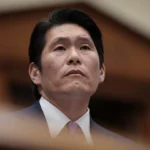⚡ Cutting through noise. Spotlighting the truth.
Trump Dismantles Education Department

Why He’s Taking Aim
Trump dismantles education department—that’s the headline making waves across the country after the former president signed an executive order to begin dismantling the U.S. Department of Education. Supporters say it’s a long-overdue correction that puts power back in the hands of states and local communities. Critics call it reckless. One thing is clear: this marks a dramatic shift in the decades-long debate over who controls America’s classrooms.
States Poised to Take the Lead
On March 20, 2025, Trump signed an executive order tasking former SBA Administrator Linda McMahon with leading the wind-down of the federal department. This isn’t just symbolic—it’s the start of structural change. Backed by Congressional allies like Ohio’s Michael Rulli, legislation is already in motion to formalize the transition.
Trump’s plan doesn’t eliminate education funding but does change who controls it. Federal block grants would continue, but it would be up to state governments—not Washington bureaucrats—to decide how those funds are spent. Programs like Title I and Pell Grants would remain, with local decision-makers setting the priorities.
Why Trump Is Targeting the Education Department
Supporters of Trump’s plan argue the Department of Education has failed to deliver results despite overseeing nearly $240 billion in spending during fiscal year 2024. National test scores in reading and math remain stagnant—or worse, in decline.
“It’s about accountability,” Trump said at a recent rally. “Why should parents, teachers, and communities need permission from Washington to help their kids succeed?”
By returning control to the states, the administration hopes to cut red tape and allow innovation to flourish. Red states like Florida and Texas are already pushing ahead with curriculum reforms centered on classical education, career readiness, and parental rights.
Praise and Pushback from Both Sides
The reaction has been fast and deeply polarized.
Conservative groups like Moms for Liberty have praised Trump dismantling the education department as a move that restores traditional values and empowers local communities. Social media lit up with support, calling it a bold stand against federal overreach.
Progressives, however, see it differently. Rep. Bobby Scott (D-VA) warned the move could strip protections for vulnerable students—those with disabilities, from low-income families, or learning English. Civil rights groups fear states with fewer resources may struggle, worsening educational inequality.
Political and Economic Fallout
Trump dismantling the education department isn’t just about schools—it’s a political and economic gambit.
While it energizes the conservative base, it also risks alienating moderate voters. A recent NPR/PBS poll showed 63% of Americans oppose closing the Department of Education altogether.
And economically, the transition will be messy. States will need to scale up their administrative capacity fast, especially in rural areas. Critics argue this could lead to gaps in oversight and service, while supporters call it a necessary price for freedom and reform.
What’s at Stake for Families and the Nation
What does this mean for students, parents, and educators?
In red states, expect accelerated efforts around school choice, parental rights, and resistance to controversial curricula. In blue states, expect more resistance, lawsuits, and efforts to preserve existing federal standards.
Ultimately, this isn’t just about money or mandates—it’s about who defines the purpose of public education. Trump dismantling the education department reopens a high-stakes national debate over values, control, and accountability.
Conclusion and Takeaways
Trump’s order to dismantle the Department of Education has reignited the culture war in America’s classrooms. It’s a bold, controversial move that will energize supporters and enrage critics.
Whether it succeeds depends on Congressional backing, state cooperation, and public trust in local leaders to handle the responsibility. For now, the education system has been thrown into the political spotlight once again—with no sign of things calming down anytime soon.
Sources and Further Reading
Rep. Bobby Scott on Federal Oversight
NPR/PBS Poll on Education Policy
U.S. Department of Education Budget Overview (2024)
Remarks by Donald Trump, March 2025 Rally
Moms for Liberty – Official Statements
Want updates like this delivered weekly? Join the Spotlight X newsletter




